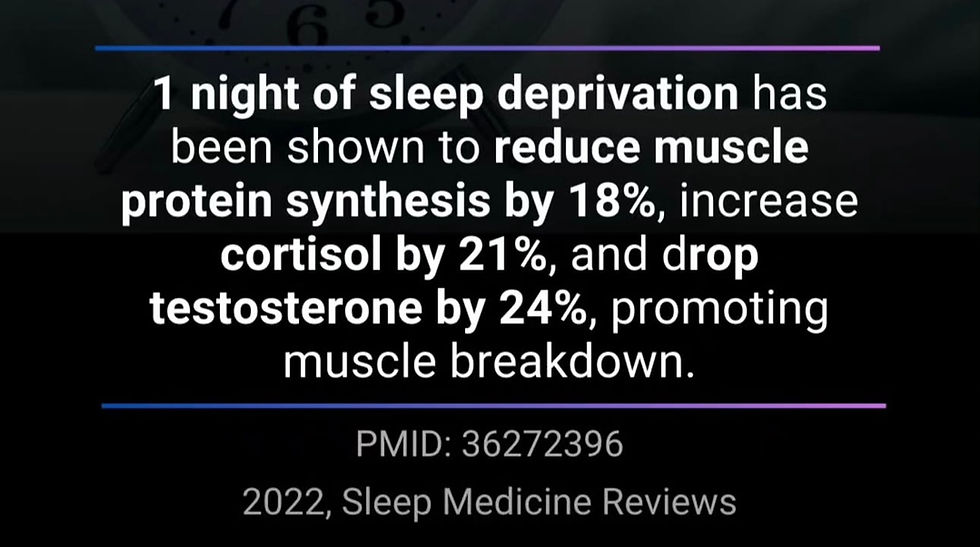Sleep Like a Champion: Why Every Athlete Needs Their Z's
- Joseph Caligiuri
- Mar 6
- 3 min read

The alarm clock shows midnight. Practice was intense. You've got homework to finish. Sound familiar? For high school and college athletes, sleep often takes a backseat. But research shows this choice carries serious consequences for your athletic performance.
Recent studies reveal that just one night of sleep deprivation can reduce muscle protein synthesis by 18%, increase cortisol by 21%, and drop testosterone by 24% - creating the perfect storm for muscle breakdown rather than growth.

Let's explore why sleep might be your most underrated performance enhancer.
10 Ways Sleep Deprivation Destroys Athletic Performance
1. Your Muscles Can't Recover
Sleep isn't just downtime - it's when your body repairs muscle tissue damaged during training. Without adequate sleep, your recovery stalls. Those 8 hours in bed translate directly to stronger muscles and better performance.
2. Your Hormones Get Wrecked
One sleepless night increases cortisol (stress hormone) by 21% and decreases testosterone by 24%. This hormonal imbalance sabotages your ability to build muscle and recover from workouts.
3. Your Reaction Time Slows
Studies show that sleep-deprived athletes react significantly slower than well-rested ones. In sports where milliseconds matter - basketball, football, soccer - this deficit can determine winning or losing.
4. Your Decision-Making Suffers
Sleep deprivation impairs frontal lobe function, making it harder to make quick strategic decisions during competition. You might know what to do in theory, but your sleep-deprived brain can't execute.
5. Your Injury Risk Skyrockets
Research from the NCAA shows sleep-deprived athletes suffer more injuries. Your coordination decreases and your body's protective mechanisms aren't as responsive when you're tired.
6. Your Endurance Plummets
Sleep loss reduces glycogen storage - your muscles' primary fuel source during extended activity. This means hitting the wall earlier in training and competition.
7. Your Mental Game Weakens
Sleep deprivation increases anxiety and reduces confidence. The mental toughness coaches demand? It's built on a foundation of proper sleep.
8. Your Growth Potential Decreases
Growth hormone peaks during deep sleep. Miss those hours, and you miss your body's prime window for development and recovery.
9. Your Learning Ability Diminishes
Learning new plays, techniques, or strategies becomes significantly harder when sleep-deprived. Your brain simply cannot form new neural connections efficiently.
10. Your Motivation Drops
Perhaps most damaging is how sleep deprivation affects your drive. The discipline to train, practice, and compete at your best requires energy that comes from proper rest.
How to Optimize Your Sleep as a Student-Athlete
1. Prioritize 7-9 Hours Nightly
Make sleep non-negotiable. Schedule it like you would practice or homework.
2. Create a Sleep Routine
Go to bed and wake up at consistent times, even on weekends. Your body thrives on rhythm.
3. Power Down Electronics
The blue light from screens disrupts melatonin production. Put devices away 30-60 minutes before bedtime.
4. Make Your Room a Sleep Sanctuary
Keep it cool (65-68°F), dark, and quiet. Consider blackout curtains and white noise if needed.
5. Be Strategic About Naps
If you can't get a full night's sleep, strategic 20-30 minute naps can help reduce sleep debt. Just avoid napping too close to bedtime.
6. Watch Pre-Sleep Nutrition
Avoid heavy meals, caffeine, and alcohol before bed. A light protein-rich snack may help muscle recovery during sleep.
7. Manage Stress
Practice relaxation techniques like deep breathing or gentle stretching before bed to calm your nervous system.
Remember: while your competitors focus on training harder, you can gain a significant edge by simply recovering smarter. In the competitive world of sports, proper sleep isn't just helpful - it's essential.
Your future athletic performance depends not just on what you do in the gym, but on how seriously you take your recovery time. Sleep isn't for the weak - it's for those determined to be champions.




Comments